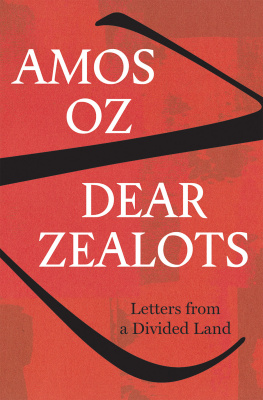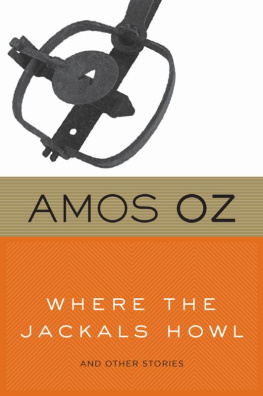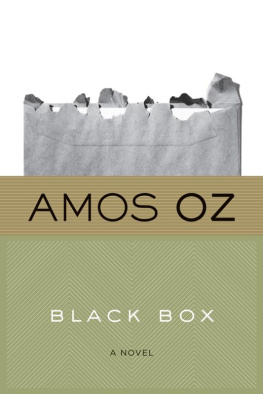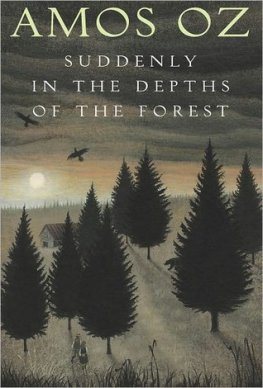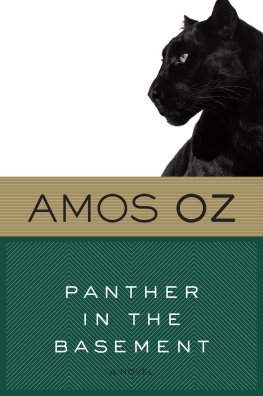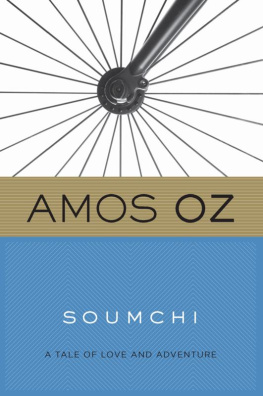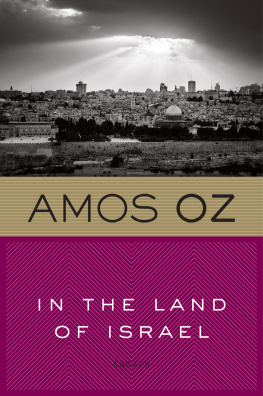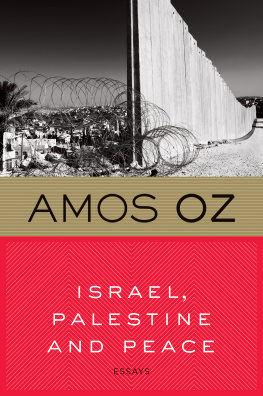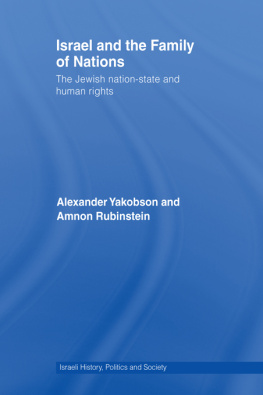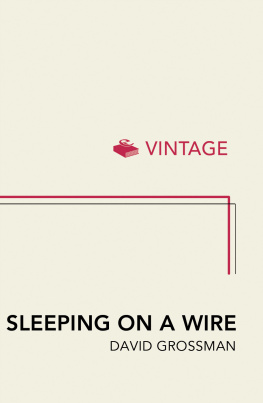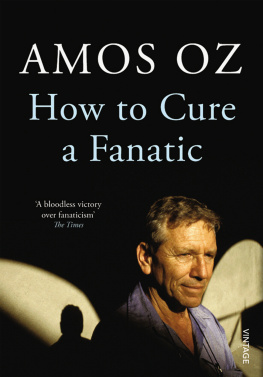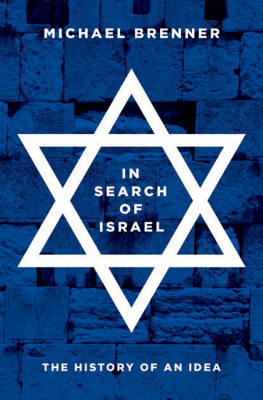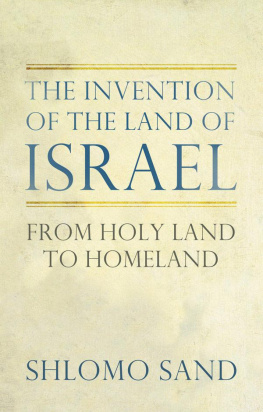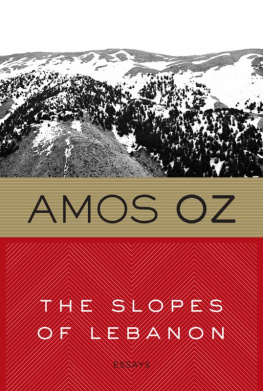First Mariner Books edition 2019
Copyright 2017 by Amos Oz
Translation copyright 2018 by Jessica Cohen
All rights reserved
For information about permission to reproduce selections from this book, write to or to Permissions, Houghton Mifflin Harcourt Publishing Company, 3 Park Avenue, 19th Floor, New York, New York 10016.
First published in Hebrew as Shalom la-Kanaim
hmhbooks.com
Library of Congress Cataloging-in-Publication Data
Names: Oz, Amos, author. | Cohen, Jessica (Translator)
Title: Dear zealots : letters from a divided land / Amos Oz ; translated from the Hebrew by Jessica Cohen.
Other titles: Shalom la-Kanaim Hebrew
Description: Boston : Houghton Mifflin Harcourt, [2018] | Includes bibliographical references.
Identifiers: LCCN 2018017516 (print) | LCCN 2018018571 (ebook) | ISBN 9781328987563 (ebook) | ISBN 9781328987006 (hardcover) | ISBN 9780358175445 (paperback)
Subjects: LCSH: Fanaticism. | Judaism and humanism. | DemocracyReligious aspectsJudaism. | Toleration.
Classification: LCC BF575.F16 (ebook) | LCC BF575.F16 O913 2018 (print) | DDC 892.4/6dc23
LC record available at https://lccn.loc.gov/2018017516
Cover design by Martha Kennedy
Author photograph Colin McPherson
v2.1019
The Place Where We Are Right by Yehuda Amichai, from The Selected Poetry of Yehuda Amichai, edited and translated from the Hebrew by Chana Bloch and Stephen Mitchell. University of California Press, 1996.
The essay Dear Zealots is based on a series of lectures delivered at the University of Tbingen in Germany, in 2002, and subsequently published in How to Cure a Fanatic, a small book that was translated into more than twenty languages. The essay appears here in an expanded and updated version.
The essay Many Lights, Not One Light derives from the book Jews and Words, which I wrote with my daughter Fania Oz-Salzberger in 2012 (Yale University Press). It is also based on a lecture titled A Full Cart and an Empty Cart, which I delivered many years ago at Bar-Ilan University and which appeared in a concise version in my book All Our Hopes (Keter, 1998). An additional source was a lecture I gave during a Shavuot event in 2016 at the Tel Aviv home of the Shenhav family.
The essay Dreams Israel Should Let Go of Soon is based on a lecture I gave at a seminar in memory of Lieutenant General Amnon Lipkin-Shahak at the Interdisciplinary Center Herzliya, and on a different version of the lecture delivered at the Institute for National Security Studies (both in 2015).
To my grandchildren,
Dean, Nadav, Alon and Yael, with love and respect.
This book was written, first and foremost, for you.
Preface
the three essays that follow were written not by a scholar or an expert, but by a person living through and grappling with the situation. The essays common thread is my desire to take a personal look at a number of extremely controversial issues, some of which strike me as matters of life or death.
This book does not purport to describe every aspect of every disagreement or to elucidate all features of the landscape, and certainly not to have the last word. Rather, it seeks the listening ear of those whose opinions differ from my own.
Amos Oz
the place where we are right
From the place where we are right
flowers will never grow
in the spring.
The place where we are right
is hard and trampled
like a yard.
But doubts and loves
dig up the world
like a mole, a plow.
And a whisper will be heard in the place
where the ruined
house once stood.
Yehuda Amichai, translated by
Stephen Mitchell
I
=
Dear Zealots
how does one cure a fanatic? setting off in pursuit of a gang of armed zealots in the mountains of Afghanistan, the deserts of Iraq, or the cities of Syria is one thing. Fighting zealotry itself is quite another. I have nothing new to suggest regarding desert and mountain wars, or their online counterparts. But here are a few thoughts about the nature of fanaticism and the ways we might curtail it.
The attack on the Twin Towers in New York, on September 11, 2001, much like dozens of attacks on urban centers and bustling sites around the world, did not stem from the poor being angry at the rich. Wealth disparity is an age-old injustice, but the new wave of violence is not solely, or primarily, a response to that disparity. If it were, the onslaught of terrorism would have originated in African countriesthe poorestand landed in Saudi Arabia and the Gulf statesthe wealthiest. This war is being fought between fanatics convinced that their ends sanctify all means, and everyone elseall those who hold that life is an end and not a means. It is a struggle between people who believe that justice, whatever that term may mean to them, is more important than life, and those who maintain that life takes precedence over other values.
ever since the political scientist Samuel Huntington defined the current worldwide battlefield as a war of civilizations being fought primarily between Islam and Western civilization, the prevalent worldview has been a racist picture that portrays a clash between savage terrorist Easterners and cultured Westerners. This was not Huntingtons formula, but such is the predominant sentiment aroused by his writings.
The Israeli government, for example, finds it convenient to lean on this trite Wild West formula, because it allows it to dump the Palestinians fight to cast off Israeli occupation into the same junkyard from which fanatic Muslim murderers regularly emerge to commit horrors around the world.
Many people forget that radical Islam does not have a monopoly on violent fanaticism. The destruction of the Twin Towers and the bloodshed that continues in various parts of the world are not necessarily tied to the questions: Is the West good or bad? Is globalization a blessing or a monster? Is capitalism loathsome or self-evident? Are secularism and hedonism enslavement or freedom? Is Western colonialism over and done with or has it simply taken on new forms? These questions can have different, and even contradictory, answers, without any of them being fanatic. The fanatic does not argue. If something is wrong in his view, if it is clear to him that something is wrong in Gods view, it is his duty to destroy the abomination, even if that means killing anyone who just happens to be around.
fanaticism dates back much earlier than Islam. Earlier than Christianity and Judaism. Earlier than all the ideologies in the world. It is an elemental fixture of human nature, a bad gene. People who bomb abortion clinics, murder immigrants in Europe, murder Jewish women and children in Israel, burn down a house in the Israeli-occupied territories with an entire Palestinian family inside, desecrate synagogues and churches and mosques and cemeteriesthey are all distinct from al-Qaeda and ISIS in the scope and severity of their acts, but not in their nature. Today we speak of hate crimes, but perhaps a more accurate term would be zealotry crimes, and such crimes are carried out almost daily, including against Muslims.
Genocide and jihad and the Crusades, the Inquisition and the gulags, extermination camps and gas chambers, torture dungeons and indiscriminate terrorist attacks: none of these are new, and almost all of them preceded the rise of radical Islam by centuries.


